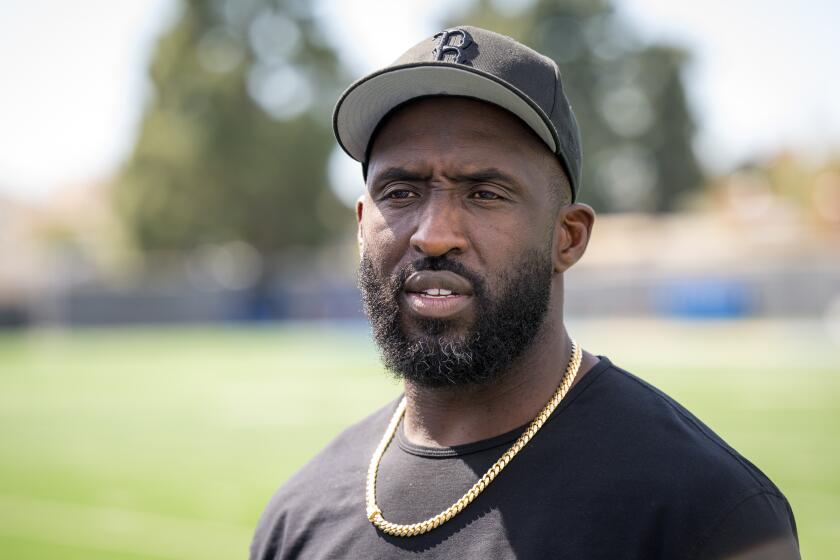In Either Role, She’s a True Officer of the Court
- Share via
She moves around a basketball court with the quickness and grace of the top athlete she used to be, yet she manages to stay all but invisible -- the mark of any good sports referee.
Anita Ortega will be among the officials working the NCAA women’s basketball Mideast Regional that begins today in Knoxville, Tenn., on the heels of her prime assignments in the Pacific 10 and Western Athletic Conference championship games.
This much the players and coaches involved can count on: No matter how close the game, how tough the call, she will somehow maintain control.
The pressure of an NCAA tournament game is nothing compared to the challenges she faces as one of the highest-ranking female members of the Los Angeles Police Department, where her communication and leadership skills are continually tested.
She supervises more than 100 officers in her duties as captain of patrol at the LAPD’s Hollenbeck Division in Boyle Heights, working to find new strategies to deal with problems in one of the city’s toughest gang neighborhoods.
“There’s a close assimilation between athletics and law enforcement,” Ortega said. “ ... You have to deal with stress and pressures. You have to be able to bring control to chaos and have certain qualities -- discipline, courage, integrity. All those things I acquired from athletics as well as my parents.”
Ortega, 45, is the oldest of three children born to a Puerto Rican father and African American mother. The family lived near USC.
“We encountered crime and the majority of things happening now in South Central,” she said. “With their guidance, focus and philosophy, it forced me to look at other options in life. Sports was an avenue for me, a release that allowed me to get away from some of the tragedy I saw as a youth.”
In her youth, Ortega broke through barriers once reserved for men and took risky paths that could have left her disillusioned. Each step of the way, lessons learned from sports competition provided guidance and inspiration to keep going.
She made UCLA’s women’s basketball team as a walk-on from Los Angeles High at a time when there were limited opportunities for girls. She became a four-year starter for the Bruins and was the leading scorer in the 1978 national championship game against Maryland.
Ortega was an All-Star in a fledgling women’s professional league before taking a job as an assistant coach at UCLA for two seasons. Then, in 1984, she joined the LAPD. Ten years ago, she started officiating high school games at the suggestion of a police friend. She quickly moved up to the college ranks.
She has never settled for being ordinary.
“Part of what you see now is a carry-over from what kind of competitor she was,” said Billie Moore, who coached Ortega at UCLA. “She didn’t just want to be another official. She worked to be one of the best. It’s part of her makeup.”
Two moments in her life helped define Ortega.
One happened in the fifth grade. She saw a bumper sticker on her teacher’s car.
“On the back were big bold letters, ‘UCLA,’ ” she recalled. “I had no idea what that meant. I approached her, ‘What does that mean?’ She said, ‘That’s a university and if you keep your grades up and work hard you can go there.’ From that point on, that’s where I wanted to go.”
The second influential moment came during a high school career day. An FBI agent spoke to students, and Ortega was immediately intrigued.
“It was always something I wanted to pursue but was sidetracked somewhat by sports,” she said.
Once she made the decision to leave coaching, law enforcement became an easy option. Many of the qualities she developed in athletics transferred to work as a police officer. And the skills she uses each day as an officer help her as an official.
“The pressure involved with officiating I don’t experience as much as other officials because for me it’s a release,” she said. “It’s something I enjoy to keep a balance in my life. It takes a lot to get me riled up on the court. I don’t call that many technicals. I think it’s so important to communicate.”
In display cases on the wall of Ortega’s office are three basketball jerseys -- one from her days as a professional player, one from playing for Puerto Rico in the Pan American Games and another when she played in the Watts Summer Games in high school.
She has accomplished so much and yet feels she has much more to do.
“A lot of it is luck, but a lot of it is drive and determination and setting goals,” she said. “There were a lot of doubters and there’s always people who think you can’t accomplish things, but I always felt young boys and girls need to associate with people who are positive and know there’s a future.”
A big disappointment for Ortega was the absence of her father, Juan, on the day she was promoted to captain in January 2002. He had died three months earlier.
“He always said, ‘When you make captain, I want to be there,’ ” Ortega said while wiping away tears. “He was there, watching from heaven.”
He’d be smiling today in admiration of a daughter who keeps blazing trails.
*
Eric Sondheimer can be reached at eric.sondheimer@latimes.com
More to Read
Go beyond the scoreboard
Get the latest on L.A.'s teams in the daily Sports Report newsletter.
You may occasionally receive promotional content from the Los Angeles Times.







